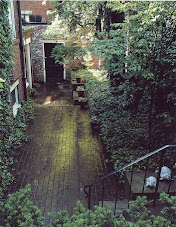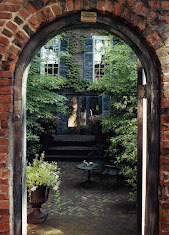The sun is shining longer, birds are chirping, and there is a hint of freshness in the air which can only mean one thing: spring is here! While spring officially started on March 20th, you never know what kind of weather we’ll get here in New England. April always has much more of a “spring feeling” and with it comes National Garden Month, as designated by the National Garden Bureau. To honor this month-long spring-focused celebration, we wanted to share a brief history of a few topics related to gardening that might pique your interest, especially this time of year.
For those of you who have been to the State House before, you’ve likely been to Beacon Hill, exploring shops and restaurants while walking over the old cobblestone streets. Did you know there are hidden gardens throughout Beacon Hill? In the 1820s and 1830s, row houses were built in Beacon Hill and behind them were long, narrow yards. These yards, which were strictly functional in those days due to the lack of modern plumbing and other services, were used for the outhouse, trash pits, laundry, and summer cooking.
 |
Image of garden on
Mt. Vernon St, Beacon Hill |
 |
Image of garden on
West Cedar St, Beacon Hill |
By the 1920s, a few homeowners were able to transform these backyard functional spaces into areas of enjoyment and in 1929, the Beacon Hill Garden Club was established. Gone were the days of laundry lines, outhouses, and sheds and in their place, flowers started to bloom and greenery took over, as you can see from the following more-modern day images.
 |
| Image of garden on West Cedar St, Beacon Hill |
The
Beacon Hill Garden Club, an organization committed to urban landscaping and education, offers a tour of a handful of these gardens each year. This year’s tour is taking place on
Thursday, May 18th with spaces open between the hours of 9am and 5pm.
Community gardens also have a long history here in Boston and elsewhere, though community gardening started in England during the 1700s. At the time, the countryside was transformed from open, common land to fenced off land owned by commercial farms. Cities were also being built up, with blocks upon blocks of streets containing narrow workers’ housing, and lacking open space or gardens. These rural and urban changes prevented thousands of people from accessing land that they previously depended on for food. As a result of these needs, wealthy landowners were prompted to lease small pieces of their land to farm workers as community gardens. Crafters in cities also banded together to rent land on the outskirts of town so they could plant flowers and vegetables. Around a century later, these two movements merged to create a national policy for the municipal provision of land for the purpose of community gardening.
A similar situation happened in the United States, which brought the community gardening movement overseas from England. The trigger in the US was the economic depression that took place between 1893-1897. At the start of that financial crisis, 491 banks failed. Railroad traffic was impacted over the course of the next year, which caused one-third of railroad companies to go bankrupt. At that point in history, railroads were the nation’s main industry and when they started experiencing bankruptcy, thousands of people lost their jobs. Over the course of the next few years, cities were full of workers without jobs. Cities were also becoming more built up, with skyscrapers and tall tenements replacing houses and smaller downtown buildings. It became more difficult for families to feed themselves due to all of these changes. As a result, owners rented their vacant land to workers so that they could plant potatoes, beans, and other vegetables. Changes like this were happening throughout the country, leading to the rise of community gardens.
Community gardening lives on throughout the country, including here in Boston. You can even become part of this long-standing movement! The Trustees is the largest nonprofit owner of community gardens in Boston, managing
56 gardens in the city for a total of 15 acres across eight neighborhoods. For a yearly dues, you can have a plot of land in one of the gardens in Dorchester, East Boston, the Fenway, Jamaica Plain, Roxbury, Mattapan, Mission Hill, or the South End. If you’re not ready to take the dive to tend to a garden plot or if you’re just visiting the Boston area, entrance to any of those community gardens is free of charge and is open to the public during events and programs.
Of course, we can’t talk about gardens in the Boston area without talking about the Boston Public Garden. Established in 1837, the Boston Public Garden was America’s first public botanical garden.Did you know it was established two-hundred years after Boston Common? The Common was America’s first public park. It served as a practical space with walkways made so that people could cross town. The Public Garden, however, was decorative. It was (and still is) filled with flowers, greenery, and paths made for wandering and enjoying the outdoors. You’ll also find fountains, monuments, and of course the swan boats! This year the swan boats take to the water on April 15th!
Click here for more information.
With spring in the air and National Garden Month upon us, we hope you can get out and enjoy all that New England, and especially Boston, has to offer this time of year!
Works consulted:
Jessica Shrey
Reference Librarian
















